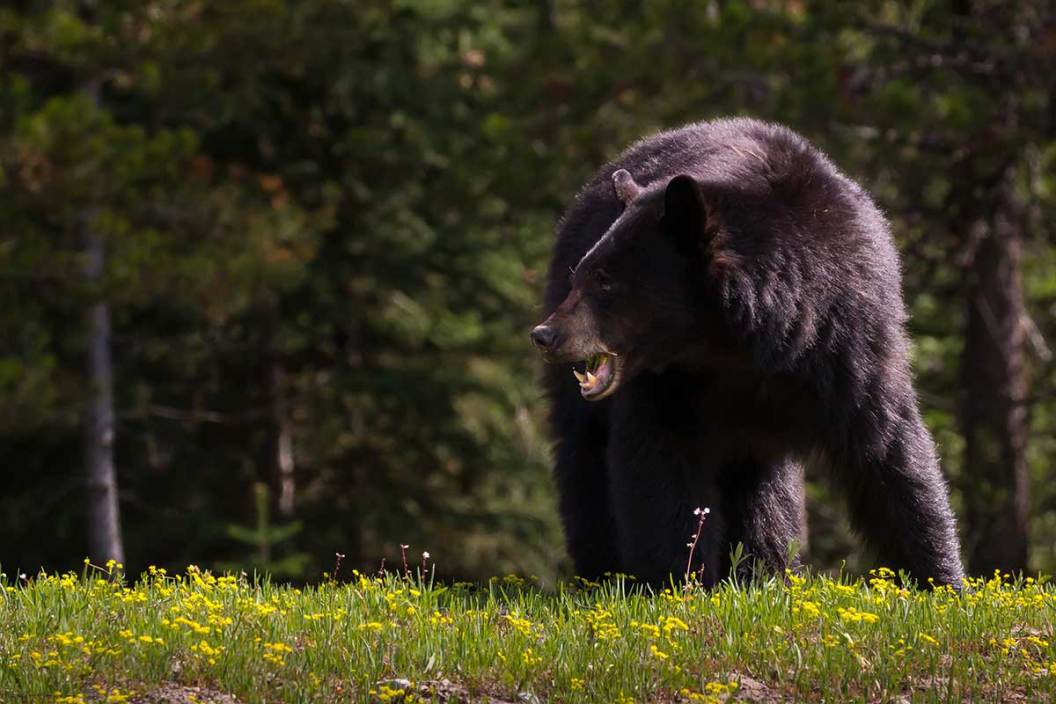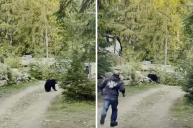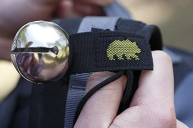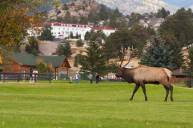What's the best course of action if you come across a black bear in your outdoor adventures? Preparedness and the ability to remain calm are your best weapons. Bear behavior can change with the season, as well as food availability and whether there are cubs present. Here's what you should keep in mind the next time you travel through bear country.
Black Bear Behavior
Black bears are the smallest of the North American bear species and are also the most widely distributed. They are omnivores that will eat anything that they can get their paws on, which means they can get aggressive at times if food is involved. You'll find most of them in forested areas with widespread vegetation, but also near population centers in search of food.
Black bears inhabit a wide variety of different habitats, including famed mountainous regions as well as crop country covered in corn fields.
Any bear hunter will tell you they generally shun any human presence, making them quite difficult to approach for a shot. However, they can become aggressive around a food source, putting campers and hikers in national and state parks at risk.
How Dangerous Are Black Bears?
It should be said that generally black bears are not dangerous and attacks are very uncommon. But they do occur every year, most commonly in a sow's aggressive response to protect her cubs.
Black bears often make what is known as a bluff charge, which is basically the bear's way of saying that it doesn't want an encounter, either, but it could change its mind in a heartbeat. Bears sometimes do this by making blowing noises and swatting the ground with their forepaws to say, "Back off."
What to Do if a Black Bear Sees You
Chances are, black bears will smell or hear you long before you ever see them, which means they'll likely flee before you ever see them back. If you're still or quiet for a while, it's possible to encounter a bear that doesn't notice you're there, in which case, your best course of action is to not attract its attention and quietly put some distance between the two of you.
In the case of a mutual sighting, there are steps you can take to prevent a dangerous situation from unfolding. First, you need to make sure the animal has an escape route, as a cornered bear may become aggressive. Stand still but prepare to move away quietly and slowly. Running in the opposite direction can and will cause a chase response, so slow movements are key.
What to Do if a Black Bear Approaches You
The universally accepted survival tactic here is to stand your ground. This does not mean to make aggressive movements towards the bear, but rather show that you aren't intimidated by its presence. As black bears generally do not wish an encounter with a human, they'll usually just move away from you.
Loudly shout something like "Go away, bear!" and attempt to make yourself look as large and unappealing to mess with as possible by raising your arms, opening your jacket, and clapping your hands. Some say standing on a rock or a stump can help as well, but forget about climbing a tree, as black bears are likely better climbers than you are.
What to Do if a Black Bear Turns Aggressive
None of us will honestly ever know what we would do in a bear attack unless it happens. But, for those of us who frequent bear country, it's best to devise a plan beforehand in the unlikely event that a black bear goes on the offense.
Sometimes the best defense is a good offense, and that's where bear spray comes in clutch. If a bear charges you, you need to be ready to defend yourself, and bear spray—i.e., pepper spray in a larger, more powerful dispenser—is your first line of defense.
It's still a possibility that making noise, becoming larger, and spraying won't stop a bear. At this point, you may find yourself in a battle with a wild animal and you need to keep your mind on one thing: survival.
Virtually all sources now say to fight back and to not play dead, despite outdated theories that implied a bear would leave a dead-looking human alone. Use whatever you have available such as a walking stick, a branch, a pair of binoculars, rocks, a backpack or whatever else you can reach as a weapon. Kick, bite, scream, or go for its eyes; this is not a refereed fight.
How to Avoid Bear Encounters in the First Place
Hikers and campers can prevent unwanted encounters with black bears by forming a few simple habits. Wearing a bear bell while hiking can keep wild animals at bay in the first place. Always travel in groups when possible, even if it's just two at a time. If traveling with children, keep them close enough to see at all times. Keep dogs on a leash, as they're slaves to their noses and can smell when something is different in the air and go investigating on a moment's notice.
A black bear is a wild animal and it has a tremendous sense of smell. This is what usually creates most of the issues with humans. When camping, do not store food in your tent; keep your campsite free of leftover foods; store your food, trash, and other items that might smell good to a bear inside your vehicle; and use the campground's bear-proof bins whenever possible. Tent campers should take even more caution, going as far as changing out of the clothes they cooked in before going to sleep.
That said, are black bears dangerous? In the grand scheme of things, no—as long as you're careful and follow this advice, they'll stay out of your way if you stay out of theirs.
READ MORE: Moose Are Surprisingly Dangerous. Here's What to Do if You See One




